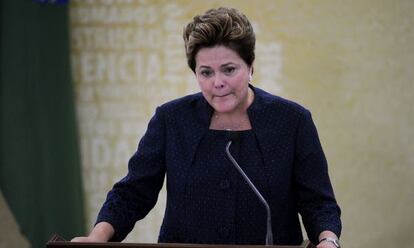Brazilian truth panel begins looking at military crimes
President swears in new commission to look into offenses committed during former regimes

After much controversy and debate, Brazilian President Dilma Rousseff on Wednesday swore in a new Truth Commission to look into crimes, including forced disappearances, that took place during the military regimes that governed the country from 1964 to 1985.
On May 10, Rousseff appointed seven members of the commission that will be charged with looking into these crimes to hopefully determine what happened to the estimated 450 people who disappeared.
The commission will have two years to look into crimes committed, but its findings will not lead to criminal charges against any former military officers because the Brazilian Constitution affords them amnesty. The formation of the panel has been a sticky issue, largely because the military has been very critical of any government digging up its past. In March, about 235 officers signed an open letter criticizing Rousseff for not disciplining one of her Cabinet members who came out publicly in support of revising the amnesty law.
Rousseff's lawyer
Among those appointed to the panel was lawyer Rosa María Cardoso de Cunha, who defended Rousseff when she was arrested and tortured in the late 1960s for belonging to a leftist urban guerrilla group VAL-Palmares, whose members were accused of the high-profile murder of soldier Mário Kozel Filho in 1968. Officers say that the truth panel should also call in former guerrilla leaders to testify about their roles in terrorist activities.
The formation of the panel comes in the wake of a stir created by the publication of a new book in which a former Brazilian police officer admits to burning 10 corpses of people who disappeared at a sugarcane plant in Rio de Janeiro. The plant belonged to the family of a former deputy governor, Heli Ribeiro Gomes. Cláudio Guerra, 71, said that he had decided to confess to his crimes because he has become an evangelical minister, reports the daily Folha de São Paulo.
Guerra, who says he will appear before the Truth Commission, also says that he took part in a terrorist attack in 1981 in an effort to prevent the restoration of democracy.
The daughter of the former governor, María Cecilia Ribeiro Gomes, 55, said that she was astonished by Guerra's confessions. "This is nonsense; he must be crazy," the daily quotes her as saying.
Tu suscripción se está usando en otro dispositivo
¿Quieres añadir otro usuario a tu suscripción?
Si continúas leyendo en este dispositivo, no se podrá leer en el otro.
FlechaTu suscripción se está usando en otro dispositivo y solo puedes acceder a EL PAÍS desde un dispositivo a la vez.
Si quieres compartir tu cuenta, cambia tu suscripción a la modalidad Premium, así podrás añadir otro usuario. Cada uno accederá con su propia cuenta de email, lo que os permitirá personalizar vuestra experiencia en EL PAÍS.
¿Tienes una suscripción de empresa? Accede aquí para contratar más cuentas.
En el caso de no saber quién está usando tu cuenta, te recomendamos cambiar tu contraseña aquí.
Si decides continuar compartiendo tu cuenta, este mensaje se mostrará en tu dispositivo y en el de la otra persona que está usando tu cuenta de forma indefinida, afectando a tu experiencia de lectura. Puedes consultar aquí los términos y condiciones de la suscripción digital.








































